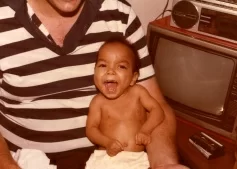 without a thought on my part. But Luke came to my mind yesterday and I looked up some information on him and discovered that his birthday had just passed. I found this old article that I wrote about Luke a few years ago. I thought I'd share it again. I am convinced that there are important and significant lessons we can learn from his life, and that I need to regularly share what I think they are. I hope you enjoy this!
without a thought on my part. But Luke came to my mind yesterday and I looked up some information on him and discovered that his birthday had just passed. I found this old article that I wrote about Luke a few years ago. I thought I'd share it again. I am convinced that there are important and significant lessons we can learn from his life, and that I need to regularly share what I think they are. I hope you enjoy this!The mysteries of God are a part of the Christian life that can often lead to confusion, doubt and even discouragement for believers.
- For some, it's a pride thing. We want to have answers – we want to understand, to be able to grasp the complexities of Biblical truth and God's plan for mankind.
- For some, God's mysteries – the unexplained things of life – are stumbling blocks to faith:
1. Why do bad things happen to good people?
2. Why does He allow pain, suffering and evil to thrive in our world?
Several months ago we were witnesses to the aftermath of the tragedy in Pennsylvania involving the Amish community, where, good, decent, hard working, non violent people were subjected to unspeakable cruelty towards their children. How can this happen?
3. One of our CSC children, who grew up in the worst poverty imaginable in Cebu City, was adopted into a family in the United States several years ago. Well meaning people would tell her how lucky she was and how God obviously had a wonderful plan for her life. She had a hard time with that and would sometimes ask her parents, "But what about all the kids who are still there, who weren't adopted, and who are still suffering and dying? What is God's wonderful plan for their lives? Why me and not them?
For many of us, we celebrate the goodness of God in our lives, we praise him for his healing, for material comforts, for blessing our efforts – even as we observe people who remain sick or disabled, who suffer in poverty – those who efforts and initiatives end in disappointment and ruin.
There are two extremes in terms of people's reactions to the things about God and life that are not understood.
1. There are those who try in vain to grasp the ungraspable – to be able to reduce the mysteries to understandable formulas or explanations. I remember a young seminarian who came to Cebu and who filled the pulpit of our church on a Sunday evening. He preached for an hour on the "peace of God that passes all understanding." Perhaps he felt that if he preached long enough he could crack that nut and open our understanding!
We all know those who have reduced the book of Revelation to precise charts and timetables, giving us easy to understand categories for all of human history and, most especially, the times to come.
2. A second category are those who shake their heads and say, "We'll only know these answers when we get to heaven." They suspend inquiry, not bothering to seek answers to the perplexing questions of life.
Living and working in a Third World country like the Philippines brings some of these mysteries to the front of our lives. Poverty, and all that goes with it, is "in your face." People often ask me "How do you like living in the Philippines?" That's a tough one to answer. Life anywhere has its highs and lows. Some days are great, others are difficult. I often answer this way:
1. When I'm sitting down to a nice breakfast I am aware that, within a few meters of my house are families that have no breakfast.
2. When I'm driving to the office or the Shelter I often pass people walking along the road who, for lack of a few cents can not even afford public transportation and must walk.
3. When I stop to buy medicine for my family or the CSC kids, there are people standing nearby whose children are dying for lack of that very same medicine.
Why am I blessed and they are not?
I recall a conversation with a missionary a few days after Cebu was hit by a strong typhoon. Many of our CSC workers lost their roofs or their entire homes. The houses of the poor were devastated by the high winds and torrential rains. The missionary said that it had been such a miracle how God spared the missionary homes from damage, holding his hands of protection around us during the storm. I remember wondering whether it wasn't more a matter of our having cement houses and strong metal roofs.
Why did our CSC kids have to suffer so much? And how much more, those who live on the street and cannot be admitted to CSC?
These are tough questions. When it comes to trying to understand our own suffering, the Bible gives some answers. For example, Romans 5:3-4 tells us that suffering produces perseverance, perseverance character, and character, hope. And the Bible gives us additional hope that we will someday come to see God's purpose and mysteries:
"But now we see through a glass dimly, but then face to face."
And we hear the testimonies of Christian brothers and sisters who have lived through terrible times and have turned negatives into positives in their lives.
Several months ago I was attending a conference in Bismark, North Dakota. One of the featured speakers was Steve Saint, Steve's father, Nate Saint, was one of the five missionaries killed in 1956 by Aucan warriors in Equador. Steve told about what that tragic day meant to his family, and what it was like when his dad, his hero, didn't come home that day. We saw video of his current family life, and saw a man who was interacting with Steve's children, and who was being referred to as "Uncle." It turns out that this was the very man who had killed Steve's father, who had come to know Jesus and had experienced the forgiveness of God and of the Saint family and now was a part of their family – an amazing story of how good things had come out of tragedy and suffering.
So the clear message is that God has a plan for our lives, we will discover that plan in the right time. He is writing our life's stories, but some of the chapters are difficult ones.
We can understand this. We can, when aided by the Holy Spirit, see how difficulties and suffering are part of a purification process for us, and that we, like Job, will eventually be better people for it.
But what about people who, because of major disabilities, are unable to understand their situation, unable to discern the hand of God or his plan for their lives. Where is the purification and growth and ultimate value for these people? What could God's purpose possibly be?
Back on 1982 a baby was born in a charity ward in a small hospital in Cebu City. 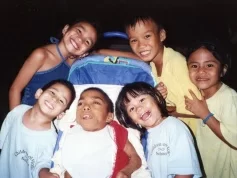 The baby underwent cardiac arrest during birth and was without oxygen for an extended time. Unlike many cases of charity patients, the hospital staff decided to resuscitate the baby, even after he had suffered massive brain damage and cerebral palsy. The baby's mother abandoned him in the hospital, and after a couple months Luke was referred to CSC. When we took him in he appeared to be a bouncing baby boy. We did not know that he would not develop physically beyond about a year and a half, or mentally beyond a few months. Luke would never speak, nor have voluntary movement of his arms or legs.
The baby underwent cardiac arrest during birth and was without oxygen for an extended time. Unlike many cases of charity patients, the hospital staff decided to resuscitate the baby, even after he had suffered massive brain damage and cerebral palsy. The baby's mother abandoned him in the hospital, and after a couple months Luke was referred to CSC. When we took him in he appeared to be a bouncing baby boy. We did not know that he would not develop physically beyond about a year and a half, or mentally beyond a few months. Luke would never speak, nor have voluntary movement of his arms or legs.
Luke became a fixture at CSC. For over 23 years he was an integral part of our lives and a symbol of CSC and what we are all about.
Many times Luke would be hospitalized – often due to upper respiratory infections. He fought for his life many times. There were at least a dozen times when we were sure that he would die. The doctors had told us that he wouldn't make it past five years old. Then they revised it to nine, then 11 – certainly he wouldn't reach his teenage years.
One time, when Luke was critically ill our staff met to pray and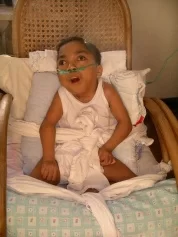 I asked them to reflect on his life. Here is why: I believe that God had a purpose for Luke's life when he created him. I believe that He uses people like Luke to teach us important things. But here is the rub: If we don't spend time reflecting on these lessons, then Luke's life is useless. Its up to us to allow God to make sense of Luke's life.
I asked them to reflect on his life. Here is why: I believe that God had a purpose for Luke's life when he created him. I believe that He uses people like Luke to teach us important things. But here is the rub: If we don't spend time reflecting on these lessons, then Luke's life is useless. Its up to us to allow God to make sense of Luke's life.
And what are the lessons that we found? What has God taught us through his life?
1. First, life is precious. Even though he had nothing to live for, from the world's point of view, Luke clung to live almost ferociously. Some of us who have much more to live for take life casually, we take life for granted. Not Luke. Every day was a struggle. Every breath had to be fought for. Life is a gift from God and we should treat it carefully.
2. God has provided us with opportunities, through Luke's life, to minister to him in significant and life-saving ways. He has provided an avenue for us to live out the biblical mandate to minister unto the "least of these," because, truly, Luke was in that category. Hundreds of people have been given a blessing to participate in the support of CSC that reaches out to children like Luke and many others with other special needs.
3. In so doing, He has given us a chance to show others a Godly value system that doesn't reserve love and attention for those who have something to give back, or who have "potential" or a bright future. For many people who live in a developing country, where resources are limited, this has been a difficult lesson to learn. How could we justify spending so much money for Luke's hospitalization when other, "normal" kids needed care? Luke's life gave us the opportunity to teach about the value of life and about how God looks at all of us.
4. Luke has been a tremendous ambassador for CSC. People around the world remember observing the loving care that he received by our staff and workers. They remember his famous smiles. They may quickly forget the names of the staff or other children, but they remember Luke. "How's Luke doing?" we get asked wherever we go to talk about the ministry of CSC. And our care of Luke helps us explain the true nature and core values of our work in the Philippines.
5. Luke has been a safety valve for those that had an opportunity to know him. My job as Field Director of CSC involves lots of administrative chores, like making budgets, government relations and various kinds of problem solving. There are days when I get stressed out and start to feel the weight of the world on my shoulders. But all I needed to do is to drive a few short miles to where Luke lived, to hold him in my arms, and I get a clear picture of what real struggles are all about. My struggles paled in comparison to what Luke faced every day. Self pity may be easy for some people, but those that knew Luke have no excuse for feeling sorry for themselves. What a great gift that was to all of us.
A little over a week before we left Cebu, Marlys called me on my cell phone and told me that I should get to the hospital quickly, as Luke wasn't doing well. He had been hospitalized for over a week and his breathing was bad. I had gotten messages similar to this one throughout Luke's life, so I went to the office and took care of a few things. But the Lord laid it on my heart to go see Luke and when I entered his room his breathing was extremely labored. He looked different than I had ever seen him, and it became clear that he was dying. I sat down next to him, kissed him and looked into his eyes. For 23 years we had loved this boy. It wasn't easy to say goodbye. I said to him, "Luke. You can go. Go to be with Jesus, Luke. I love you." Within a couple of minutes Luke took his last breath. 23 years of pain, suffering, limitations, hospitalizations, forced breathing, skin rashes and infections were over. We would never see Luke's smile again.
As Luke was dying in that hospital room, I made a promise. I'm not sure if I was making a promise to Luke, to God or to myself. But I decided then and there that I was going to talk about Luke on our coming furlough. I believed then and do now, that the church of Jesus Christ needs to hear about Luke, that the lessons of his life are important ones. Many Americans are complainers - full of self pity. People who have so many material comforts are unsatisfied. American discourse is increasingly a chorus of victim and entitlement claims. Charles Sykes, in his book "A Nation of Victims: The Decay of the American Character" states that, "in a nation where everyone is a victim, no one is a victim." In our preoccupation with our own needs we have a hard time seeing the needs of others – people like Luke.
In his song "God Help the Outcasts," the Hunchback of Notre Dame poses several difficult issues:
I don't know if there's a reason
Why some are blessed, some not
Why the few You seem to favor
They fear us, flee us,
Try not to see us.
The first part we have already examined. The second is our call to arms. "Why the few You seem to favor, they fear us, flee us, try not to see us."
I don't know what factors might make it difficult for us to see the needs of society's outcasts. Perhaps we are too busy. Maybe our personal and church calendars are so full that there just isn't room for Luke, or the man who had fallen to thieves at the side of the road, to break into our day. Maybe we are numbed or fatigued by the needs of others, or simply overwhelmed by the circumstances of our own lives. Maybe we have become cynical. "Why did that guy travel this road at this time carrying that amount of money? He deserves what he got!"
Maybe, just maybe, Luke can help cut through the apathy, the self-centeredness and cynicism of our lives. He was a person with significant needs that he didn't cause. He was totally dependent on others to live. His life had none of the possibilities and opportunities that we take for granted every day. He needed us so very much. Maybe Luke can serve as a symbol of many others that we come into contact with. Maybe Luke can help us rescue our lives.
Graduation speaker - Teacher Zel
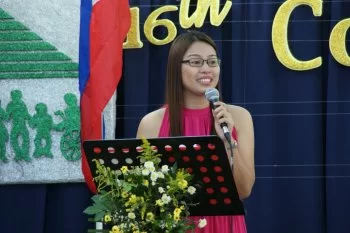 I would like
say thank you, not only that Children of Hope School has given me a remarkable
honor, but also for the weeks of fear and
anxiety that I have endured at the thought of this big responsibility.
The sleepless nights finally convinced me that I can be a speaker once in my
lifetime. Since I had been here for five
years as a school teacher, it is a great advantage because I can
think that this is a simple reunion.
I would like
say thank you, not only that Children of Hope School has given me a remarkable
honor, but also for the weeks of fear and
anxiety that I have endured at the thought of this big responsibility.
The sleepless nights finally convinced me that I can be a speaker once in my
lifetime. Since I had been here for five
years as a school teacher, it is a great advantage because I can
think that this is a simple reunion.
I have finally set my heart and mind about what I am going to talk about today. To the graduates, particularly Eugene, Epifanio, Analiza, and Wilmar, today is a day of celebration and thanksgiving. You have all worked hard to make it to this day. It has been a long journey and you have reached this far.
The staff, the teachers and therapists in the school, the house parents, and the uncles and aunties in the shelter, were all there and have witnessed when you started practicing on holding a pencil, when you were singing loudly the ABC song, when you were learning to write the letters of the alphabet, when you were trying to read the words with care, and when you were tirelessly counting the numbers from 1 to 100 until you have grown up and have improved your abilities like writing your stories and autobiography, performing an experiment in science, solving problems in math, and showcasing your talent in theater, music and arts, and even sports! Above all these, you have grown up with a personal relationship with the Lord. It’s been a long journey to have finished your elementary years in school, to have developed skills and values, and to grow up rich in spirit. Congratulations, graduates!
Going back to my own elementary commencement, just like you sitting in the front row, my heart was filled with thanksgiving. At 12 years old, I had already been planning on becoming a teacher and had dreamed of landing a job because, primarily, I wanted to elevate my family's situation. My parents were poor and , thus, I am poor. Then, when I was in the 5th grade, my father passed away. But I am blessed that my family stayed strong and had faith in the Lord. Since then, every day is a miracle. Although I am very much acquainted with the hardships in life, I did not use being poor as an excuse not to finish my education. As a matter of fact, with the support of my family, teachers and friends, I had all the motivation to work harder, to do well in my studies, and to give the best version of myself. I am very determined to learn more and even willing to run an extra mile for education.
In the midst of the challenges and hardships in life, I was successful in my academic journey. So, after college, I looked for a job. In June 2009, I was accepted here in Children of Hope School as a shadow teacher of Wilmar and an I.I. instructor for the kids in the afternoon. After a year, I was promoted to a regular teaching job and was assigned in Level B2. Some of you here were once my students then.
So why am I telling you all of this? That day on my elementary graduation, I was young like you, but was very determined to reach my dreams. And now with the blessings of the Lord, I have made some of them come true, like being a teacher and to have done the things that I love to do. Therefore, I want you to be reminded of not giving up on your dreams and to have faith that you will reach your goals. More than that, I am humbled that I was a part of this ministry and learned that life is more meaningful when it is shared with a cause. My five year stay in this school was one of the memorable times in my life and it was way greater than what I have dreamed of.
To the graduates, be grateful to the people that have supported you along the way. The CSC staff and supporters, the childcare staff which includes the uncles and aunties in the shelter, the medical staff, the teachers and therapists in school, and the maintenance staff, they were the set of people who DARED to choose you, serving and molding you to become what you are right now. They are the set of people who CARED not about your past, but on where you’re heading in the future. They are the set of people who SHARED their time, effort, love, and prayers so you won’t be left behind. They dared, cared, and shared because you are special. So dear graduates, we need you to make the most of the wonderful opportunities that have been given to you.
You may not remember everything I’ve said today, but my message to you is that: Do not give up on your dreams and make them all come true. My hope is that you will have the passion, the courage, the faith, and the sense of responsibility it takes so that you’ll be successful in high school and in the next years of your education. Again, congratulations and God bless you graduates. Thank you very much.
The Art Exhibit of Creative Young Minds
Last week the Cebu Children of Hope School students participated in a Art Exhibit at school. They had been working on different art projects throughout the school year in art class. Teacher Jimmer their art teacher decided to display and sell their work in an exhibit. The evening started off with a ribbon cutting and the opening of the exhibit. People enjoyed looking at the art, visiting with one another and enjoying snacks and refreshments.The kids were proud to display their artwork for all to see. 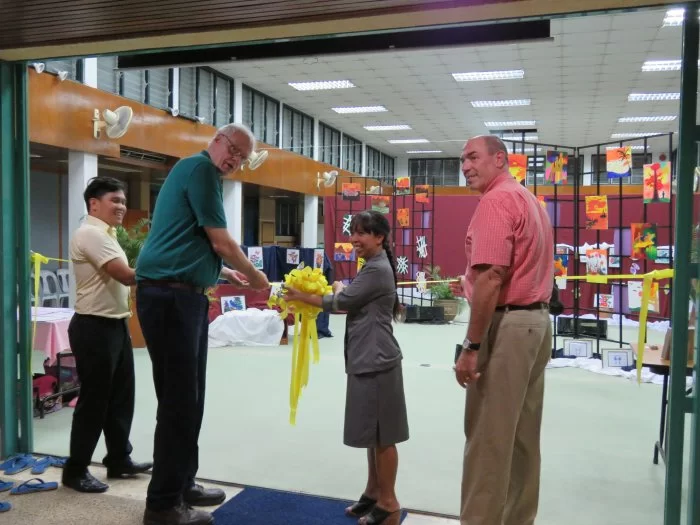 For the Opening of the exhibit, uncle Paul cutting the ribbon. Teacher Cris, Teacher Jimmer and uncle Mitch holding the ribbon.
For the Opening of the exhibit, uncle Paul cutting the ribbon. Teacher Cris, Teacher Jimmer and uncle Mitch holding the ribbon. 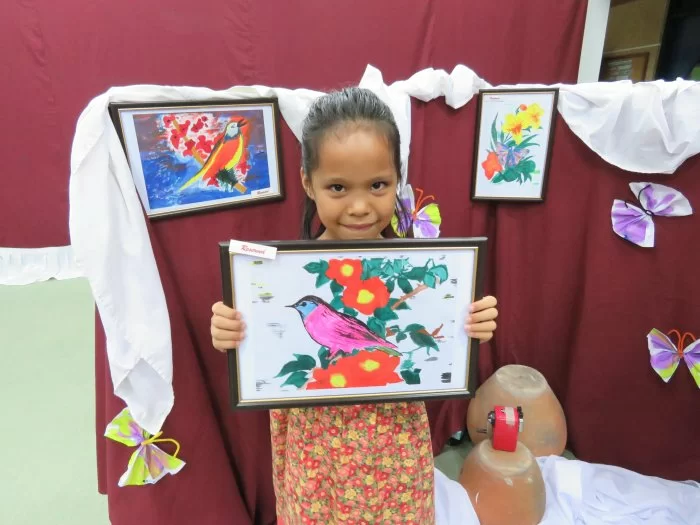
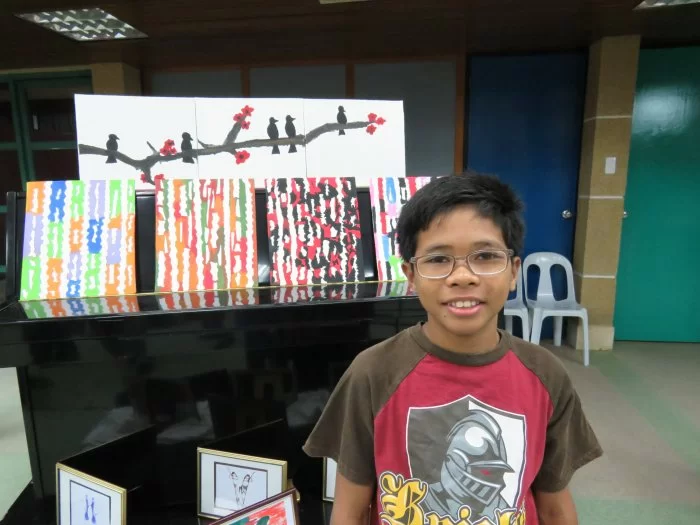
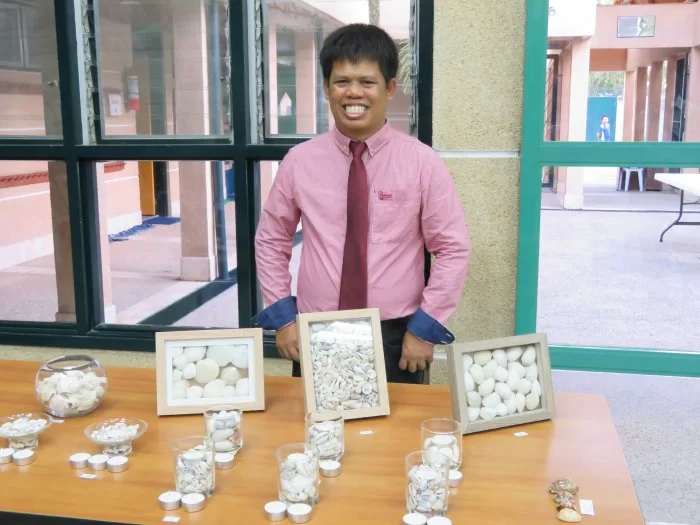
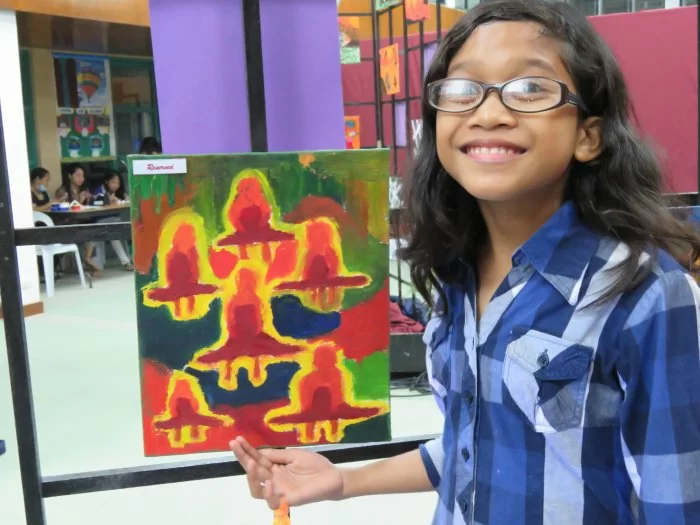
An Open Letter
Dear Wilmar,
Today, you will be marching as a graduate of Cebu Children of Hope School. Congratulations! What an accomplishment! I also congratulate all your teachers, past and present, for all of this would not be possible without their unconditional teaching hearts.

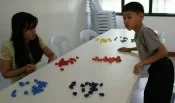


I also want to congratulate your house parents, Auntie Lourdes and Uncle Patrick, and the rest of the aunties at the shelter who have been a great help in your growth. A special thanks to Auntie Teoping for her amazing love; I know she will always have a special place in your heart. A game of basketball and badminton would not be the same without her.
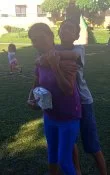
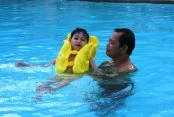
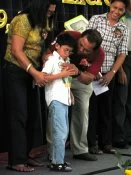
Let me take you back nine years ago when we first met. You were such a cute peanut. You were very eager to learn, be at school and at therapy. It was never a pain working with you because you made it fun and interesting for me. Remember our games of basketball in the therapy room using the back of the ceiling fan as a basketball hoop? (Of course we used a beach ball and a not a regular ball because we didn’t want to get in trouble!) And dips in the Jacuzzi in the therapy room—why we never turned the air conditioner off is still a mystery to me! You always kept me on my toes. I was “Tin-Tin” to you then, years later I was “Checher Jinks” and then finally became “Teacher Jinkee;” one of the many examples of the progress you have made.
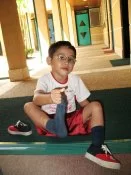
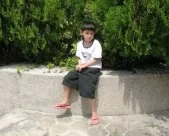
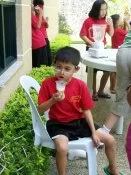

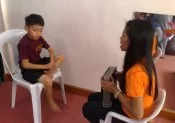


You have always been a performer. Not a day passes by when we do not hear you sing. I am still in awe of how easily you pick up a song after hearing it only once. You have always shared your silly antics at parties and programs at school and the shelter. I will never forget your dance moves. And you never fail to make us laugh.
You have made good friends over the years. Friends who are also classmates, helpers and buddies. Although they sometimes complain about the “noise” you make, there is always a hand holding and guiding you in school activities and programs. That to me is an amazing bond of friendship.
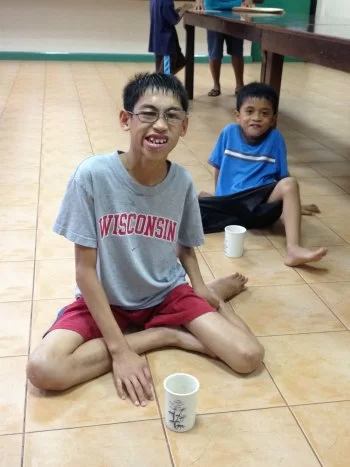
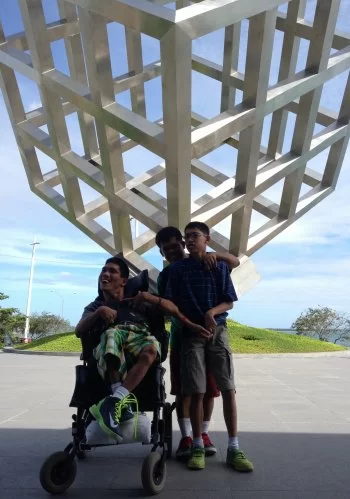
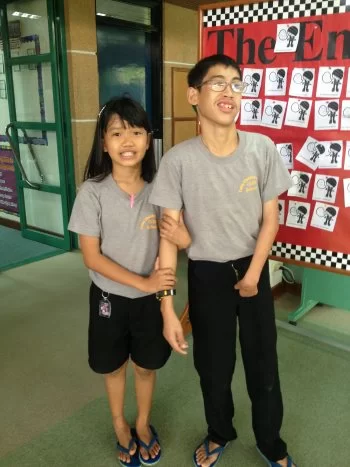
As you march today, let every step you take up to the stage be a representation of your progress and growth, your teachers and therapists, your aunties and uncles, and the staff and friends who have supported you all these years.
I might not be able to hold back my tears—which by the way is very hard to do while writing this—but know that I am very proud of you. I, together with the rest of the people at CSC, will be here to support you in the next stage of your life.
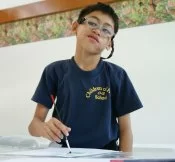
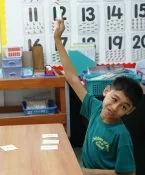

Remember what our friend Dory said? Just keep swimming, just keep swimming, just keep swimming, swimming, swimming. What do we do? We swim, swim, swim.
Your Friend,
Teacher Jinkee
The Miracle of Walking
A little toddler boy goes walking down the hallway during the school day pushing a cart. It looks cute and some people pause to watch. If you didn't know the back story, you wouldn't really think twice about it except that he seems a bit young to be at school. Maybe you'd wonder why he is pushing the cart or why he is wearing ankle weights. Otherwise, it wouldn't seem all that significant.
Back up a couple of years. This little guy had some significant troubles when learning how to walk, so the therapists started physical therapy to help strengthen his legs. The therapists kept working with the little guy and he started to make small gains. Then, when he had enough strength and coordination to stand and walk with assistance, they had the idea of making a suspension harness. What a cool contraption! And the little guy got really good at walking and even running in that thing.
Now the next step to becoming stronger and more coordinated while walking needed a new kind of aid, something like a walker that old people use sometimes. So a cart was made just the right size and weight to be able to move around, but still provide some support. To make the exercise even more beneficial, ankle weights were added to the mix.
So that's the cute, excited toddler with the blue cart and weights on his legs walking around school each day. It's taken a lot of hard work and ingenuity, but it's been worth it. Look at him go!
A name
I just finished a meeting with our social workers and I was reminded of the work that they do to locate birth documents for our children and, sometimes, their parents. It can be incredibly complicated work, often involving hospitals or community midwives, parishes, local government officials, civil registrars and census offices and other government offices. Often, if our child has no birth document we have to file a delayed registration of birth. This work takes a lot of know-how on the part of our social workers, and a lot of persistance and dedication. Many of our kids do not have any birth record when they come to live at CSC. Without a birth document we cannot process adoption papers. And, if a child returns to his or her birth family, or stays with us in our teen home, they will have difficulty in registering for school or finding employment. Its tough to navigate through life if you can't prove you exist!





